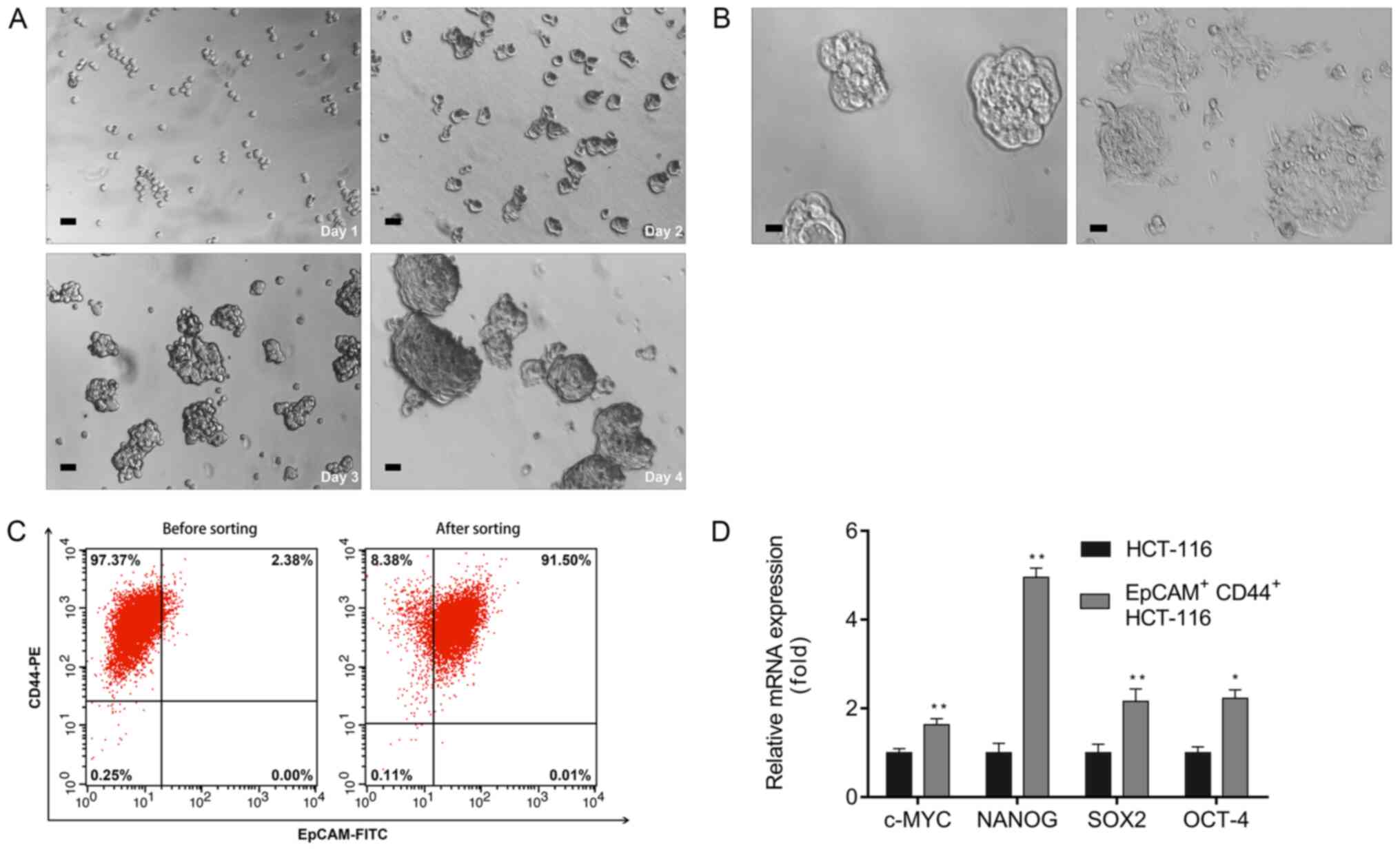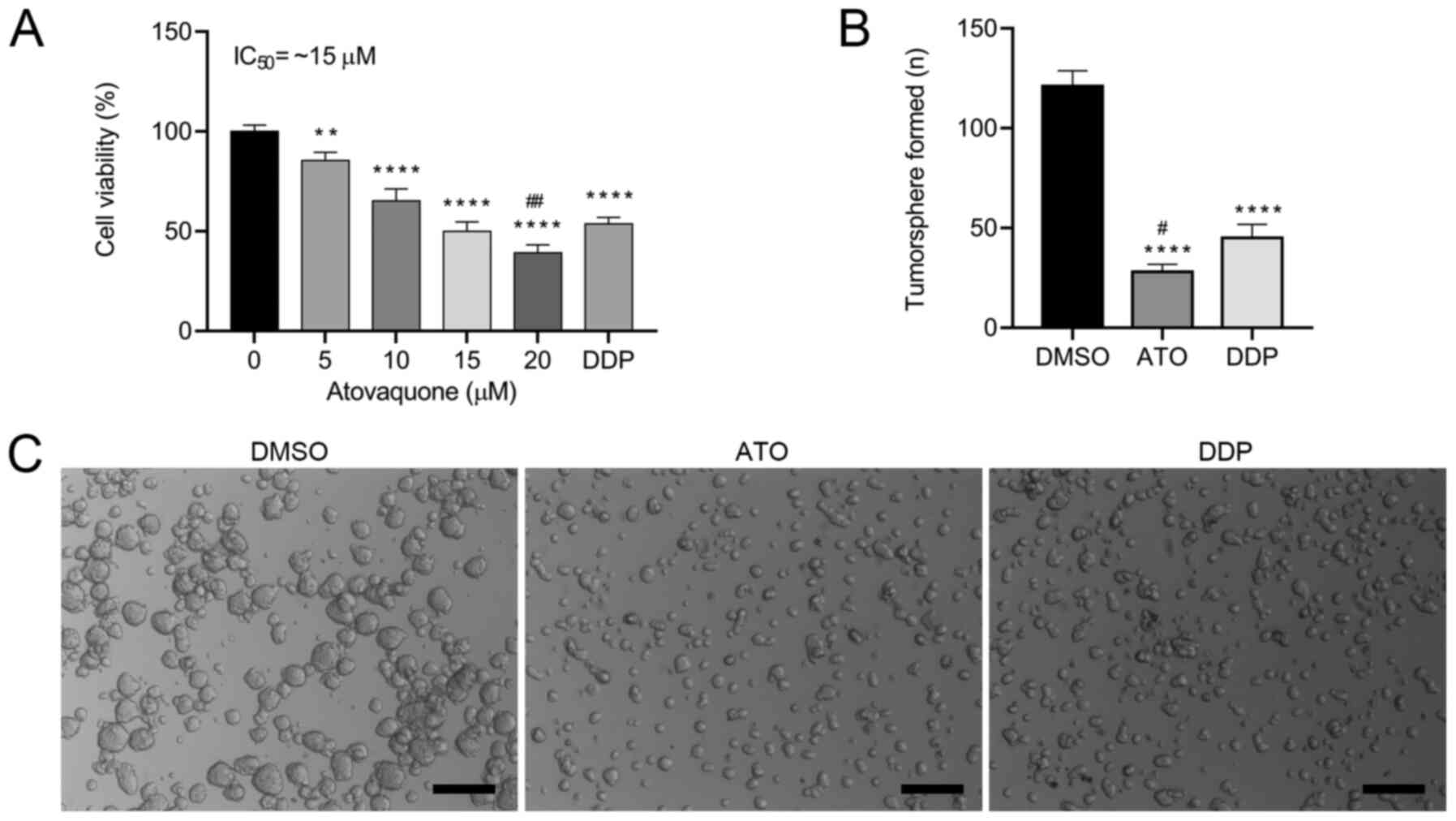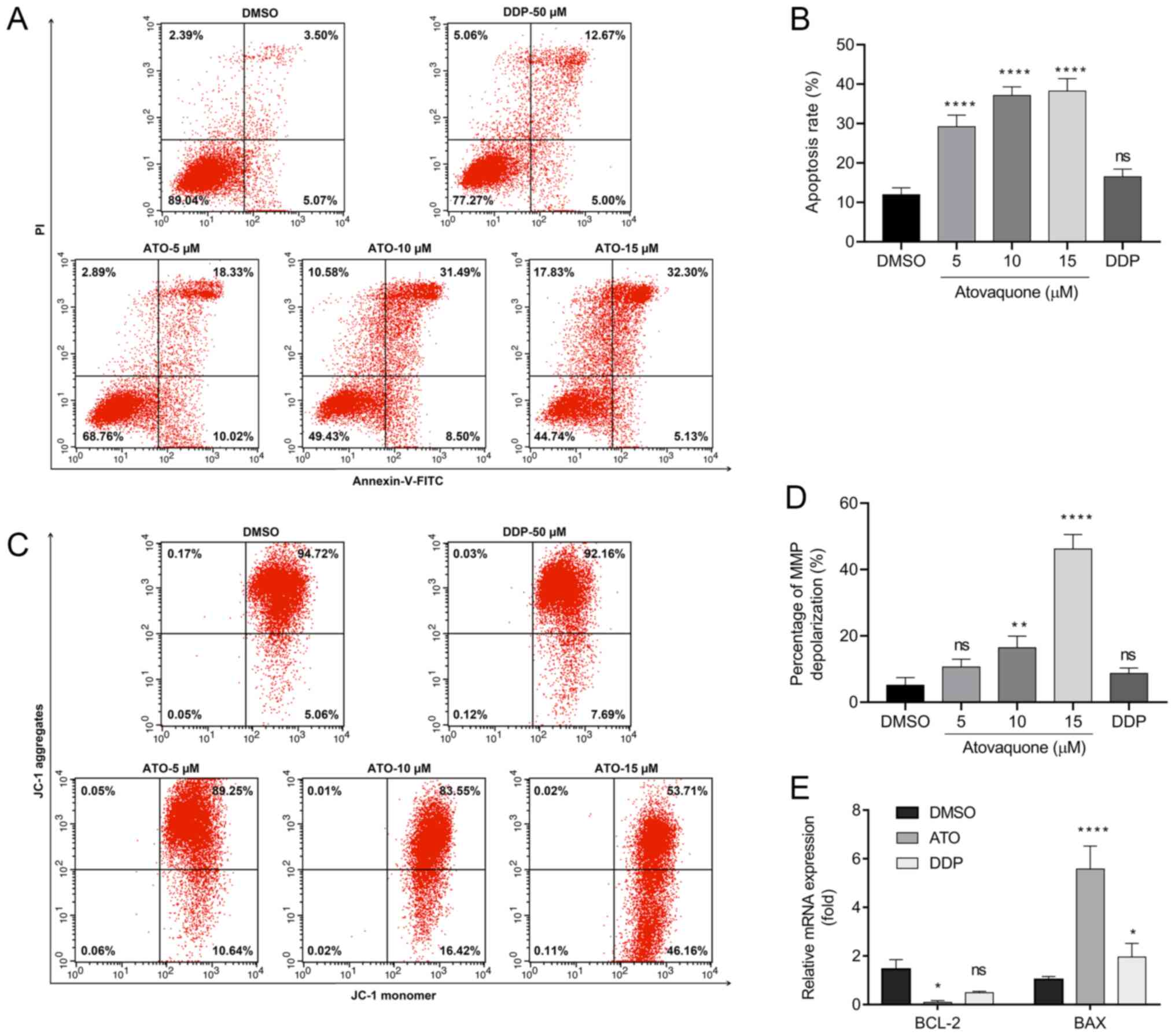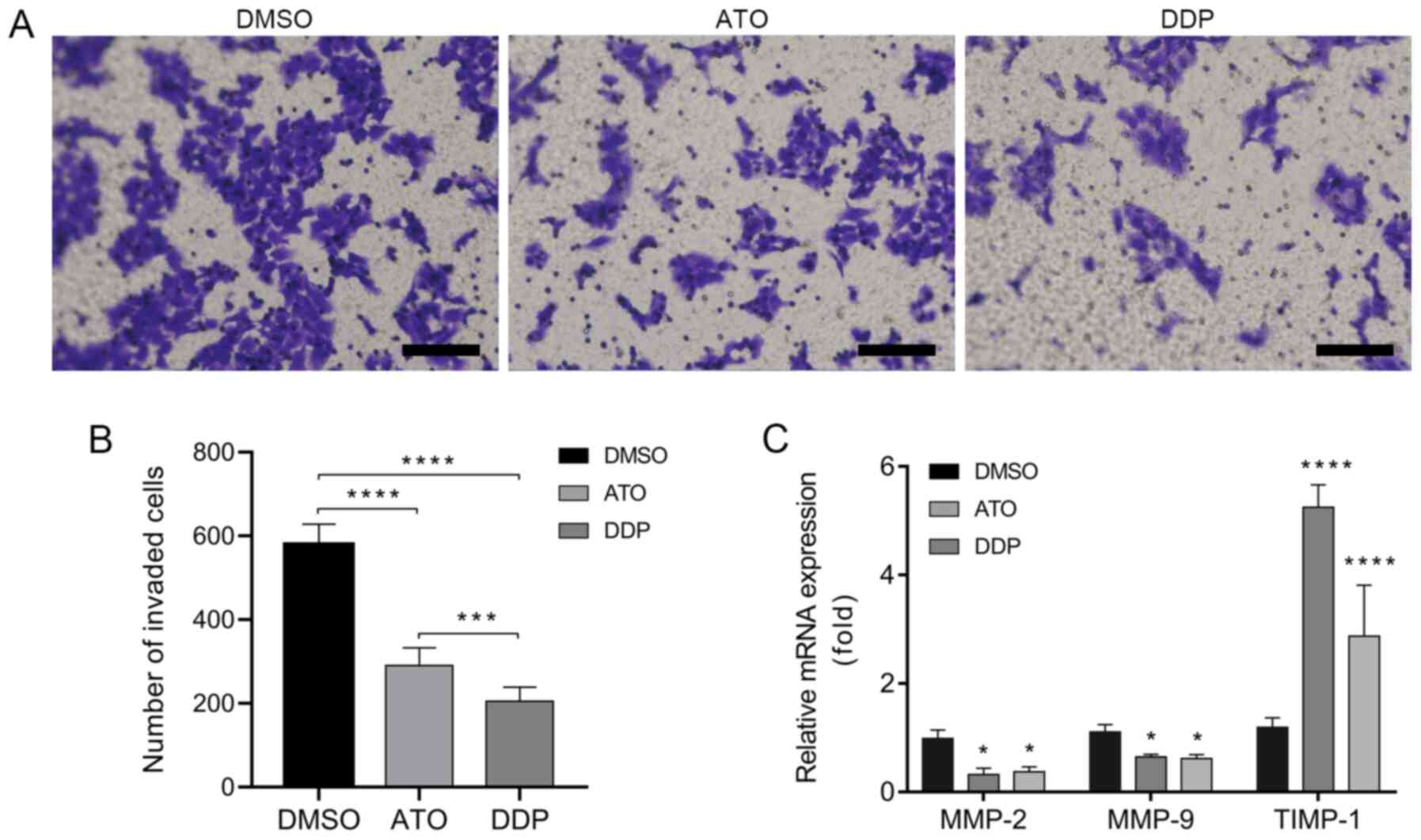|
1
|
Siegel RL, Miller KD and Jemal A: Cancer
statistics, 2020. CA Cancer J Clin. 70:7–30. 2020.PubMed/NCBI View Article : Google Scholar
|
|
2
|
Dalerba P, Dylla SJ, Park IK, Liu R, Wang
X, Cho RW, Hoey T, Gurney A, Huang EH, Simeone DM, et al:
Phenotypic characterization of human colorectal cancer stem cells.
Proc Natl Acad Sci USA. 104:10158–10163. 2007.PubMed/NCBI View Article : Google Scholar
|
|
3
|
Ricci-Vitiani L, Lombardi DG, Pilozzi E,
Biffoni M, Todaro M, Peschle C and De Maria R: Identification and
expansion of human colon-cancer-initiating cells. Nature.
445:111–115. 2007.PubMed/NCBI View Article : Google Scholar
|
|
4
|
Nguyen LV, Vanner R, Dirks P and Eaves CJ:
Cancer stem cells: An evolving concept. Nat Rev Cancer. 12:133–143.
2012.PubMed/NCBI View
Article : Google Scholar
|
|
5
|
Nandy SB and Lakshmanaswamy R: Cancer stem
cells and metastasis. Prog Mol Biol Transl Sci. 151:137–176.
2017.PubMed/NCBI View Article : Google Scholar
|
|
6
|
Todaro M, Alea MP, Di Stefano AB,
Cammareri P, Vermeulen L, Iovino F, Tripodo C, Russo A, Gulotta G,
Medema JP and Stassi G: Colon cancer stem cells dictate tumor
growth and resist cell death by production of interleukin-4. Cell
Stem Cell. 1:389–402. 2007.PubMed/NCBI View Article : Google Scholar
|
|
7
|
Was H, Czarnecka J, Kominek A, Barszcz K,
Bernas T, Piwocka K and Kaminska B: Some chemotherapeutics-treated
colon cancer cells display a specific phenotype being a combination
of stem-like and senescent cell features. Cancer Biol Ther.
19:63–75. 2018.PubMed/NCBI View Article : Google Scholar
|
|
8
|
Szarynska M, Olejniczak A and Kmieć Z: The
role of cancer stem cells in pathogenesis of colorectal cancer.
Postepy Hig Med Dosw (Online). 70:1469–1482. 2016.PubMed/NCBI View Article : Google Scholar
|
|
9
|
Dawood S, Austin L and Cristofanilli M:
Cancer stem cells: Implications for cancer therapy. Oncology
(Williston Park). 28:1101–1107, 1110. 2014.PubMed/NCBI
|
|
10
|
Muz B, de la Puente P, Azab F and Azab AK:
The role of hypoxia in cancer progression, angiogenesis,
metastasis, and resistance to therapy. Hypoxia (Auckl). 3:83–92.
2015.PubMed/NCBI View Article : Google Scholar
|
|
11
|
Vaupel P, Mayer A and Höckel M: Tumor
hypoxia and malignant progression. Methods Enzymol. 381:335–354.
2004.PubMed/NCBI View Article : Google Scholar
|
|
12
|
Zhou J, Schmid T, Schnitzer S and Brune B:
Tumor hypoxia and cancer progression. Cancer Lett. 237:10–21.
2006.PubMed/NCBI View Article : Google Scholar
|
|
13
|
Stamenkovic I: Matrix metalloproteinases
in tumor invasion and metastasis. Semin Cancer Biol. 10:415–433.
2000.PubMed/NCBI View Article : Google Scholar
|
|
14
|
Hicklin DJ and Ellis LM: Role of the
vascular endothelial growth factor pathway in tumor growth and
angiogenesis. J Clin Oncol. 23:1011–1027. 2005.PubMed/NCBI View Article : Google Scholar
|
|
15
|
Graham K and Unger E: Overcoming tumor
hypoxia as a barrier to radiotherapy, chemotherapy and
immunotherapy in cancer treatment. Int J Nanomedicine.
13:6049–6058. 2018.PubMed/NCBI View Article : Google Scholar
|
|
16
|
Strese S, Fryknas M, Larsson R and Gullbo
J: Effects of hypoxia on human cancer cell line chemosensitivity.
BMC Cancer. 13(331)2013.PubMed/NCBI View Article : Google Scholar
|
|
17
|
Srivastava IK, Rottenberg H and Vaidya AB:
Atovaquone, a broad spectrum antiparasitic drug, collapses
mitochondrial membrane potential in a malarial parasite. J Biol
Chem. 272:3961–3966. 1997.PubMed/NCBI View Article : Google Scholar
|
|
18
|
Takabe H, Warnken ZN, Zhang Y, Davis DA,
Smyth HDC, Kuhn JG, Weitman S and Williams Iii RO: A Repurposed
drug for brain cancer: Enhanced atovaquone amorphous solid
dispersion by combining a spontaneously emulsifying component with
a polymer carrier. Pharmaceutics. 10(60)2018.PubMed/NCBI View Article : Google Scholar
|
|
19
|
Fiorillo M, Lamb R, Tanowitz HB, Mutti L,
Krstic-Demonacos M, Cappello AR, Martinez-Outschoorn UE, Sotgia F
and Lisanti MP: Repurposing atovaquone: Targeting mitochondrial
complex III and OXPHOS to eradicate cancer stem cells. Oncotarget.
7:34084–34099. 2016.PubMed/NCBI View Article : Google Scholar
|
|
20
|
Tian S, Chen H and Tan W: Targeting
mitochondrial respiration as a therapeutic strategy for cervical
cancer. Biochem Biophys Res Commun. 499:1019–1024. 2018.PubMed/NCBI View Article : Google Scholar
|
|
21
|
Gao X, Liu X, Shan W, Liu Q, Wang C and
Zheng J, Yao H, Tang R and Zheng J: Anti-malarial atovaquone
exhibits anti-tumor effects by inducing DNA damage in
hepatocellular carcinoma. Am J Cancer Res. 8:1697–1711.
2018.PubMed/NCBI
|
|
22
|
Ke F, Yu J, Chen W, Si X, Li X, Yang F,
Liao Y and Zuo Z: The anti-malarial atovaquone selectively
increases chemosensitivity in retinoblastoma via mitochondrial
dysfunction-dependent oxidative damage and Akt/AMPK/mTOR
inhibition. Biochem Biophys Res Commun. 504:374–379.
2018.PubMed/NCBI View Article : Google Scholar
|
|
23
|
Ashton TM, Fokas E, Kunz-Schughart LA,
Folkes LK, Anbalagan S, Huether M, Kelly CJ, Pirovano G, Buffa FM,
Hammond EM, et al: The anti-malarial atovaquone increases
radiosensitivity by alleviating tumour hypoxia. Nat Commun.
7(12308)2016.PubMed/NCBI View Article : Google Scholar
|
|
24
|
Fu C, Zhou N, Zhao Y, Duan J, Xu H and
Wang Y: Dendritic cells loaded with CD44 CT-26 colon cell lysate
evoke potent antitumor immune responses. Oncol Lett. 18:5897–5904.
2019.PubMed/NCBI View Article : Google Scholar
|
|
25
|
Livak KJ and Schmittgen TD: Analysis of
relative gene expression data using real-time quantitative PCR and
the 2(-Delta Delta C(T)) method. Methods. 25:402–408.
2001.PubMed/NCBI View Article : Google Scholar
|
|
26
|
Phi LTH, Sari IN, Yang YG, Lee SH, Jun N,
Kim KS, Lee YK and Kwon HY: Cancer stem cells (CSCs) in drug
resistance and their therapeutic implications in cancer treatment.
Stem Cells Int. 2018(5416923)2018.PubMed/NCBI View Article : Google Scholar
|
|
27
|
Falloon J, Sargent S, Piscitelli SC,
Bechtel C, LaFon SW, Sadler B, Walker RE, Kovacs JA, Polis MA,
Davey RT Jr, et al: Atovaquone suspension in HIV-infected
volunteers: Pharmacokinetics, pharmacodynamics, and TMP-SMX
interaction study. Pharmacotherapy. 19:1050–1056. 1999.PubMed/NCBI View Article : Google Scholar
|
|
28
|
Cosse JP and Michiels C: Tumour hypoxia
affects the responsiveness of cancer cells to chemotherapy and
promotes cancer progression. Anticancer Agents Med Chem. 8:790–797.
2008.PubMed/NCBI View Article : Google Scholar
|
|
29
|
Zhang C, Tian Y, Song F, Fu C, Han B and
Wang Y: Salinomycin inhibits the growth of colorectal carcinoma by
targeting tumor stem cells. Oncol Rep. 34:2469–2476.
2015.PubMed/NCBI View Article : Google Scholar
|
|
30
|
Xiong B, Ma L, Hu X, Zhang C and Cheng Y:
Characterization of side population cells isolated from the colon
cancer cell line SW480. Int J Oncol. 45:1175–1183. 2014.PubMed/NCBI View Article : Google Scholar
|
|
31
|
Müller M, Hermann PC, Liebau S, Weidgang
C, Seufferlein T, Kleger A and Perkhofer L: The role of
pluripotency factors to drive stemness in gastrointestinal cancer.
Stem Cell Res. 16:349–357. 2016.PubMed/NCBI View Article : Google Scholar
|
|
32
|
Larsson P, Engqvist H, Biermann J, Werner
Rönnerman E, Forssell-Aronsson E, Kovács A, Karlsson P, Helou K and
Parris TZ: Optimization of cell viability assays to improve
replicability and reproducibility of cancer drug sensitivity
screens. Sci Rep. 10(5798)2020.PubMed/NCBI View Article : Google Scholar
|
|
33
|
Chen D, Sun X, Zhang X and Cao J:
Targeting mitochondria by anthelmintic drug atovaquone sensitizes
renal cell carcinoma to chemotherapy and immunotherapy. J Bioch Mol
Toxicol. 32(e22195)2018.PubMed/NCBI View Article : Google Scholar
|
|
34
|
Baggish AL and Hill DR: Antiparasitic
agent atovaquone. Antimicrob Agents Chemother. 46:1163–1173.
2002.PubMed/NCBI View Article : Google Scholar
|
|
35
|
Nixon GL, Moss DM, Shone AE, Lalloo DG,
Fisher N, O'Neill PM, Ward SA and Biagini GA: Antimalarial
pharmacology and therapeutics of atovaquone. J Antimicrob
Chemother. 68:977–985. 2013.PubMed/NCBI View Article : Google Scholar
|
|
36
|
Zhou J, Duan L, Chen H, Ren X, Zhang Z,
Zhou F, Liu J, Pei D and Ding K: Atovaquone derivatives as potent
cytotoxic and apoptosis inducing agents. Bioorg Med Chem Lett.
19:5091–5094. 2009.PubMed/NCBI View Article : Google Scholar
|
|
37
|
Yu L, Wan F, Dutta S, Welsh S, Liu Z,
Freundt E, Baehrecke EH and Lenardo M: Autophagic programmed cell
death by selective catalase degradation. Proc Natl Acad Sci USA.
103:4952–4957. 2006.PubMed/NCBI View Article : Google Scholar
|
|
38
|
Rambold AS and Lippincott-Schwartz J:
Mechanisms of mitochondria and autophagy crosstalk. Cell Cycle.
10:4032–4038. 2011.PubMed/NCBI View Article : Google Scholar
|
|
39
|
Kinoshita M, Johnson DL, Shatney CH, Lee
YL and Mochizuki H: Cancer cells surviving hypoxia obtain hypoxia
resistance and maintain anti-apoptotic potential under
reoxygenation. Int J Cancer. 91:322–326. 2001.PubMed/NCBI View Article : Google Scholar
|
|
40
|
Zhou H and Huang S: Role of mTOR signaling
in tumor cell motility, invasion and metastasis. Curr Protein Pept
Sci. 12:30–42. 2011.PubMed/NCBI View Article : Google Scholar
|
|
41
|
Stevens AM, Xiang M, Heppler LN, Tošić I,
Jiang K, Munoz JO, Gaikwad AS, Horton TM, Long X, Narayanan P, et
al: Atovaquone is active against AML by upregulating the integrated
stress pathway and suppressing oxidative phosphorylation. Blood
Adv. 3:4215–4227. 2019.PubMed/NCBI View Article : Google Scholar
|
|
42
|
Fang Z, Tang Y, Fang J, Zhou Z, Xing Z,
Guo Z, Guo X, Wang W, Jiao W, Xu Z and Liu Z: Simvastatin inhibits
renal cancer cell growth and metastasis via AKT/mTOR, ERK and
JAK2/STAT3 pathway. PLoS One. 8(e62823)2013.PubMed/NCBI View Article : Google Scholar
|
|
43
|
Xiang M, Kim H, Ho VT, Walker SR,
Bar-Natan M, Anahtar M, Liu S, Toniolo PA, Kroll Y, Jones N, et al:
Gene expression-based discovery of atovaquone as a STAT3 inhibitor
and anticancer agent. Blood. 128:1845–1853. 2016.PubMed/NCBI View Article : Google Scholar
|



















